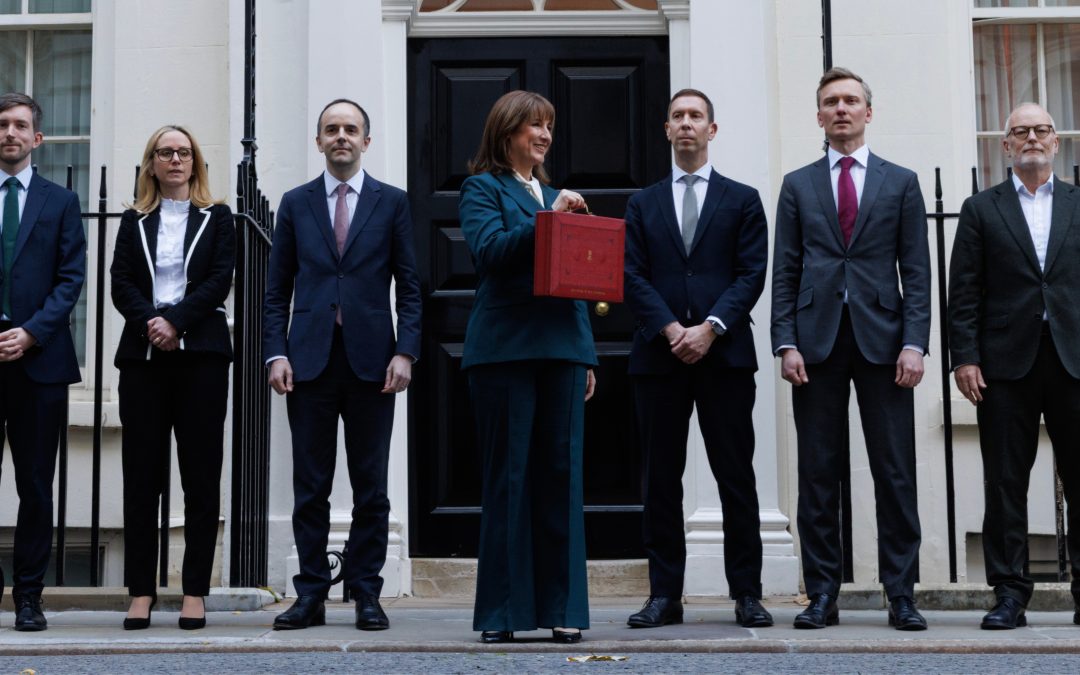The Autumn Budget has been delivered by the Chancellor, with Rachel Reeves committing to “more than doubling” headroom from £9.9 billion to £21.7 billion.
Chancellor Rachel Reeves increased the headroom with the intention of keeping within the Government’s fiscal rule to “balance the budget”.
Growth outlook for 2025 rose from the 1% forecast in March to 1.5%, but in 2026 Government expects the economy to expand by 1.4%, below a previous forecast of 1.9% in March.
The Chancellor also revealed that in response to pressure from the farming lobby, farmers who are married or have deceased spouses will be permitted to transfer their inheritance tax allowance to each other if one of them dies having not used their allowance.
Provision Trade Federation
Rod Addy, director general of the Provision Trade Federation, commented: “For all the hype around this budget, it could have been far worse for business. That said, arguably much of the damage was already done this time last year.
“The big development for our members in the dairy sector is the extension of the Soft Drinks Industry Levy to milk-based drinks, which was unwelcome, but expected. PTF members continue to work hard to enable dairy products to contribute to a healthy, balanced diet and we support the need to reduce added sugars in products to combat obesity and dental caries.”
“We are relieved that the Government chose to listen to our arguments and lessen the impact on industry by opting for a reduced lactose allowance.”
“We are relieved that the Government chose to listen to our arguments and lessen the impact on industry by opting for a reduced lactose allowance of 4.5g per 100ml rather than 4g in products, which will not count towards sugar content for the purpose of drinks tax. Lactose is a naturally occurring milk ingredient and levels have been calculated based on average amounts in semi-skimmed milk.
“Dairy products suppliers have already done much to reduce sugar in milk-based drinks and yogurts.
“Meanwhile, while plastics packaging tax is going up in line with inflation from April next year, no further rises have been announced and, all things considered, that is good news for food businesses. The fact that the Government has also committed to legislating for mass balance in calculating packaging tax may also lead to manufacturers paying less in tax than they may otherwise have done, which is also a relief.
“They have had to face the introduction of separate Extended Producer Responsibility charges for packaging disposal as well as National Insurance and Minimum and Living Wage increases, plus continued import and export costs associated with Brexit.
“Free funding for SME training for apprentices under 25 is good news for businesses of that size, while an anticipated rise in fuel duty from September 2026 will not be good news for logistics firms, or suppliers which may end up paying more for their services. As far as other issues in the budget are concerned, the freeze on income tax thresholds will leave less in consumers’ pockets, so may dampen spending to a degree.
“That said, consumers may still end up feeling relieved in view of what some of the worst fears, which have not been realised and the rise in minimum wage and lifting of the child benefit cap may offset this. Of course, it still represents increased business costs. The freeze in rail fairs will also help keep costs low for commuters.”
Institute of Grocery Distribution
James Walton, chief economist at the Institute of Grocery Distribution (IGD), commented: “This has been a tough Budget for shoppers, with Government needing to raise significant sums of money, taking taxation to record levels. IGD expects food inflation to persist into 2027, with Government policy contributing about a third of this pressure. Food inflation will run ahead of overall inflation, making food relatively more expensive.
“Therefore, food shoppers will remain extremely cautious and reluctant to spend and the operating environment for food businesses will remain extremely difficult. The next few years will be characterised by weak volume growth and tight profits across retail and away from home.
“It’s clear there’s no immediate relief on the horizon for consumers or businesses. The increased taxation will slow volume growth which means less investment for the future resilience of the food system. There are opportunities for growth out there and targeted policy changes could unlock this, especially in horticulture and poultry. These changes could release £5 billion of investment and create 60,000 jobs, and that means genuine economic progress.”
British Frozen Food Federation
Rupert Ashby, chief executive of the British Frozen Food Federation (BFFF), commented: “This budget was a moment when BFFF members had hoped to see support for their businesses from the Government. At a time of high food inflation, rising employment costs and poor growth, it feels like a missed opportunity to encourage and inspire frozen food businesses when confidence is already fragile.
“Our latest membership research makes the scale of that fragility clear. A third of frozen food businesses have already reduced their workforce in response to the increases in National Insurance and the National Minimum Wage over the past year, with reductions ranging from modest adjustments to one business that has cut its workforce by almost half and closed four sites.
“Nearly half are now reducing staff organically by maintaining a recruitment freeze, while others are seeking to manage costs by accelerating automation plans and reassessing capital investment. Members also tell us they are suspending planned projects, placing tighter conditions on suppliers and considering extended payment cycles simply to absorb the pressures they already face.
“Against this backdrop, today’s announcement offers little sense of relief or encouragement.”
“The frozen food sector is resilient, innovative and central to the UK’s food security, but it cannot continue to shoulder rising costs without consequences.”
“The announcement of funding to make training for apprentices under 25 free for small and medium-sized businesses is to be welcomed. However, the overall increases in minimum wages, especially for teenagers, could create unintended difficulties for young people looking for their first job.
“Equalising wages between younger and more experienced workers makes it harder for businesses to justify employing a very young person. Employers who are already under strain may opt for a candidate with more experience if both come at similar cost, risking reducing opportunities for young people at precisely the moment they need them most. This will inevitably hit the hospitality industry and food industry harder than some, as they rely on seasonal labour for food harvest, production and events.
“The frozen food sector is resilient, innovative and central to the UK’s food security, but it cannot continue to shoulder rising costs without consequences. Today’s budget offered a chance to give businesses renewed confidence to invest, grow and create jobs. Instead, many of our members will see it as more pressure layered on top of those they are still managing from last year.”
National Farmers’ Union
NFU president Tom Bradshaw addressed the change in the inheritance tax guidelines: “It’s good to see the Government accepts its original proposals were flawed. But this change goes nowhere near far enough to remove the devastating impact of the policy on farming communities.
“It’s only right that agricultural allowances can be transferred between spouses and it’s something we’ve been calling for, but it doesn’t go anywhere near far enough in protecting the working people of the countryside. It does nothing to alleviate the burden it puts on the elderly and vulnerable.
“It is also a huge smack in the face to the Labour MPs who have been working so hard to find a way through this for their local farmers. To them, we say thank you.
“The Chancellor said she wanted to ‘back working people not make them poorer’ and to ‘increase investment not cut it’. To do that, Government must look again at the multiple solutions that have been put forward by industry and tax experts.”
“We believe farming may benefit from the announcements on apprenticeships and it could help bring the next generation into our food and farming sector.”
Bradshaw continued: “Several other announcements in the Budget will hit farming and growing businesses hard. The increase in the National Living Wage, which will have risen 12% in two years, puts further cost pressures on agricultural and horticulture businesses and further inflationary pressures on our food system. At a time when the Government has an ambition to get the country eating more fruit and vegetables, it will hit the horticulture sector hardest.
“The increase in the autonomous tariff quota (ATQ) for sugar cane undercuts British growers at a time when this Government says promoting growth and investment at home is its priority.
“However, we believe farming may benefit from the announcements on apprenticeships and it could help bring the next generation into our food and farming sector.
“Public support over the past year has been incredible. We will need this support to continue from all sides to create the change needed to protect those people caught up in this unjust, unfair policy. The fight continues; we cannot give up and we will work with the wider industry, supply chain and MPs on next steps.”
The Food and Drink Federation
Karen Betts, chief executive of the Food and Drink Federation (FDF), said: “We recognise the Chancellor had difficult decisions to make given the challenging fiscal situation. But we would have liked to see more in this Budget on growth. Investment in productivity and growth in our sector is the best medium-term protection against the UK’s persistently high rates of food inflation, and it preserves jobs and boosts skills. While it’s positive to see the Government engaging on inflation, there’s much more Government and industry can do together now to address this.
“This includes ensuring the UK’s largest manufacturing sector receives an adequate share of Government R&D funding, maintaining stable regulation, and not overlooking food and drink in support for energy intensive industries. Where regulation needs to change, Government must ensure meaningful consultation with business – as there was on the Soft Drinks Industry Levy, but which we need to see on the Nutrient Profile Model too. The right engagement between our industry and Government will create the conditions for sustained growth, investment, and productivity gains.
“Food and drink manufacturing employs half a million people in communities across the UK and, as responsible employers, we want to ensure our colleagues are rewarded properly. However, we’re concerned that the changes to salary sacrifice for pension contributions will discourage people from adequately saving for their retirement, creating further costs for the State down the line.”
Looking at packaging, Betts said: “It’s good news the Government has committed to legislating for mass balance accounting in this Finance Bill. This means that companies using mechanically or chemically recycled plastic will no longer have to pay as much in the plastic packaging tax. It’s also welcome that Government will formally consult on the future of the costly, volatile and outdated Packaging Waste Recovery Notes (PRNs) system, and on ensuring councils run efficient, cost-controlled recycling services.
“To drive real change and value, it’s good to see Government again acknowledging the key role of producers in leading the EPR scheme, through a Producer Responsibility Organisation.”
British Retail Consortium
Helen Dickinson, chief executive at the British Retail Consortium (BRC), stated: “It was a mixed bag Budget that offered relief for many shops, but brought in new costs for others. Retailers face a delicate balancing act as they strive to invest, hire, and keep prices affordable. The announced permanent reduction in retail business rates is an important step to reduce the industry’s burden from this broken tax.
“Yet the decision to include larger retail premises in the new surtax does little to support retail investment and job creation. The welcome plan to scrap the damaging de minimis loophole was weakened by a 2029 deadline. And while increases in the National Living Wage were in line with expectations, the rise to the minimum wage for under-21s could limit employment opportunities.
“All in all, we will see winners and losers across retail and the impact for consumers will unfold in the coming months, but this Budget does not go far enough to mitigate the inflationary pressures already bearing down on the industry.”
“This Budget offered much-needed relief for some retailers, but fell short of the bold action needed to secure the long-term future of our high streets and mitigate the inflationary pressures which are currently pushing up prices for households. While the announced changes to business rates are a step in the right direction, many felt the Chancellor should have gone further.
“The 5p rates reduction for retail, hospitality and leisure properties with a rateable value below £500,000 is unlikely to fully fix the situation where retail, as 5% of the economy, pays over 20% of all business rates. Including supermarkets and anchor stores in the new surtax is a retrograde step that does little to mitigate the rising cost of food and essentials.
“Larger stores, which already pay one third of the industry’s business rates bill and employ around a million people, should have been exempted from a surtax intended to fund support for the high street.”
British Meat Processors Association
A spokesperson from the British Meat Processors Association (BMPA) commented: “There are two components to the budget that may have an impact on our members and the wider food supply chain. The increase in minimum wage will increase the cost of production but this will depend heavily on the proportion of the workforce who are on minimum wage in any one factory and how that affects wage compression at different skills and salary levels. Many jobs in the meat processing industry already pay well above this level due to the difficulty recruiting.
“The other measure that could have an impact and potentially flow through to food price inflation is the change to national insurance on pension contributions. However this is still some years away from being implemented and much can happen between now and 2029. We will be canvassing our members over the coming weeks to gauge reactions to the budget.”
Budget overview
The Chancellor confirmed that the National Living Wage will increase to £12.71 per hour for people aged 21 and over, and the National Minimum Wage will increase to £10.85 per hour for those aged 19-20. Under 18s will see wages rise up to £8, along with the apprenticeship rate.
From April 2029, Government will also charge employee and employer National Insurance on any pension contributions made via salary sacrifice above £2,000 a year and halve capital gains tax relief for bosses selling their businesses to Employee Ownership Trusts from 100% to 50%, aiming to retain a “strong incentive” for employee ownership while ensuring business owners pay their fair share.









